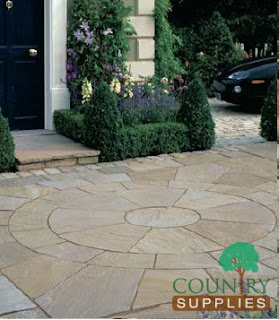Stonemarket’s stone expert Rory Kendrick discusses the popularity of Indian sandstone and how landscapers, installers and garden designers can assess the quality of the stone they select in order to avoid performance issues.
Indian sandstone has become increasingly popular over recent years. It’s an absolutely stunning product associated with a high-end luxury look and customers put a great deal of perceived value or prestige in having a natural stone patio.
However, there are many hundreds if not thousands of different types of sandstone available as paving in the UK and they all vary greatly in looks and performance. Many of the more commonly available varieties come from Rajasthan in India, or Shandong and Sichuan provinces in China.
Sandstones can appear the same when displayed at a merchant or in a brochure, but they do have different properties and can perform very differently when installed. Laboratory testing gives you a full picture of the technical quality of stone.
There are three key factors that must be considered when purchasing stone to be installed as paving in the UK and these are, water absorbency, flexural strength and frost resistance.
A stone with high water absorbency will not only turn green, (a common consumer complaint with sandstone patios) but may also be more susceptible to frost action which will degrade the stone.
In terms of flexural strength, a stone with poor strength means that the product could be easily damaged in transit, during the installation process, or simply by everyday use.
It’s also important to consider frost resistance. A stone that loses strength when subjected to repeated frosts is far more likely to fail.
There is a British Standard that covers these issues. The design and installation standard BS7533 part 12 covers the technical performance of stone, for example it provides guidance regarding the maximum water absorbency for product supplied to class 2 is 2.5%.
But not all the sandstones on the market meet the British Standard. We undertook testing on a range of stones available on the market at our in-house laboratory and found only 50% met or exceeded the British Standard.
Therefore, according to our testing, half of the stones readily available on the market are not technically up to scratch. This could cause a wide range of issues for landscapers and installers.
To ensure you select stone which is technically up to standard, we’d advise using a supplier that tests all its products and can supply you with an in-date test certificate, or declaration of performance.
If a supplier is unable to supply these details there’s no guarantee that their stone is technically sound.
At Stonemarket we’ve tested all our stone to be 100% sure that every single one meets or exceeds the British Standard.

Look out for ‘The Stone Standard’ trademark which indicates the product has been tested.


No comments:
Post a Comment